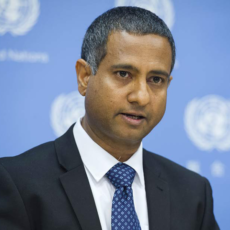 The UN Special Rapporteur on freedom of religion and belief, Dr Ahmed Shaheed, has published his annual report, which this year focuses on the impact of different relationships between religion and the state around the world. The report is particularly critical of anti-blasphemy and anti-apostasy laws and the effects they have on those with non-religious beliefs, stating that such laws ‘should be repealed immediately’. ‘Criticism of religion, religious leaders or doctrine, which is often an exercise of freedom of expression, is not a violation of freedom of religion or belief’, he said.
The UN Special Rapporteur on freedom of religion and belief, Dr Ahmed Shaheed, has published his annual report, which this year focuses on the impact of different relationships between religion and the state around the world. The report is particularly critical of anti-blasphemy and anti-apostasy laws and the effects they have on those with non-religious beliefs, stating that such laws ‘should be repealed immediately’. ‘Criticism of religion, religious leaders or doctrine, which is often an exercise of freedom of expression, is not a violation of freedom of religion or belief’, he said.
Humanists UK campaigns for the abolition of anti-blasphemy and anti-apostasy laws across the globe and is a founding member of the End Blasphemy Laws campaign. The laws breach the International Covenant on Civil and Political Rights (ICCPR) and have been responsible for both lengthy prison sentences and death sentences in countries such as Pakistan and the Maldives. The Special Rapporteur’s report drew attention to the impact blasphemy laws have on humanists and the non-religious specifically, describing how:
‘Anti-blasphemy laws… stifle the enjoyment of freedom of religion or belief, and the ability to engage in a healthy dialogue about religion. They are also used to target political dissidents, humanists, non-believers or any religious thinker who expresses different theological views than the State-sponsored religion. As also called for in several recent international action plans, such anti-blasphemy laws must be repealed as a matter of priority.’
As well as focusing on blasphemy laws, the Special Rapporteur’s report warned of the increasing trend of discrimination towards certain groups or individuals, such as those who identify as LGBT, justified on the grounds of ‘religious liberty’. The report stated that according to the Human Rights Committee it was ‘not permissible for individuals or groups to invoke “religious liberty” to perpetuate discrimination against groups in vulnerable situations’.
Dr Shaheed also highlighted that the majority of abuses of freedom of religion and belief occur within states that enforce an official religion. Dr Shaheed concluded the report by praising states that have a secular outlook with regard to politics and judicial affairs, recommending that the relationship between state and religion should be one ‘which rests on a “deep grounding of secularity based on human rights”’.
Humanists UK Director of Public Affairs and Policy Richy Thompson commented, ‘We welcome the renewed call for the abolition of anti-blasphemy and anti-apostasy laws by the Special Rapporteur in his report. The damage they cause in so many countries is deeply unnecessary and the threat they represent for humanists and others of non-religious belief is staggering. We hope that on the back of this report real progress can be made towards the repeal of anti-blasphemy laws across the globe.’
Last week, Humanists UK made an intervention concerning anti-blasphemy laws at the ongoing 37th Session of the United Nations Human Rights Council (UNHRC) in Geneva, during an interactive dialogue with the Special Rapporteur. Dr David Harvey, Humanists UK’s representative, called for an end to anti-blasphemy laws and also for a crackdown on ‘conscience clauses’ which all too frequently promote intolerance on false grounds of ‘religious liberty’.
Notes
For further comment or information, please contact Humanists UK Director of Public Affairs and Policy Richy Thompson at richy@humanists.uk or on 020 3675 0959.
Read the Special Rapporteur’s full report on freedom of religion and belief: http://www.ohchr.org/EN/HRBodies/HRC/RegularSessions/Session37/Documents/A_HRC_37_49_EN.docx
Read Humanists UK’s intervention: https://humanists.uk/wp-content/uploads/2018-02-28-FINAL-ID-on-FoRB.pdf
Read more about Humanists UK’s international campaigns: https://humanists.uk/campaigns/international-campaigns/
At Humanists UK, we advance free thinking and promote humanism to create a tolerant society where rational thinking and kindness prevail. Our work brings non-religious people together to develop their own views, helping people be happier and more fulfilled in the one life we have. Through our ceremonies, education services, and community and campaigning work, we strive to create a fair and equal society for all.
